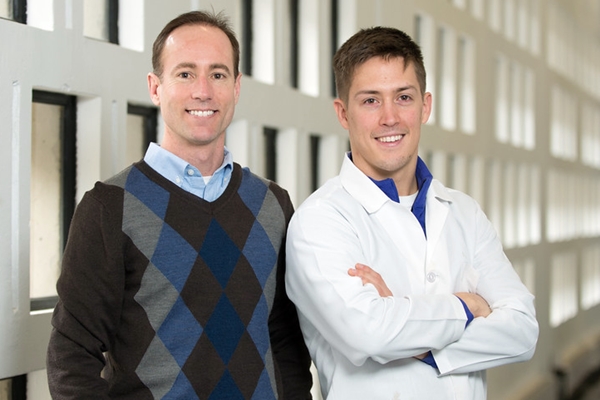1 July 2016. A biotechnology company and university lab developed and tested in mice a technique for packaging antigens that induce an immune response in vaccines, which combines E. coli bacteria and a biocompatible polymer material. The team from University at Buffalo in New York and spin-off enterprise Abcombi Biosciences published its findings in today’s issue of the journal Science Advances.
Researchers led by Buffalo engineering professor Blaine Pfeifer and Charles Jones, CEO of Abcombi Biosciences Inc., are seeking to improve the delivery of antigens, proteins that induce an immune response, in vaccines. In some cases, vaccines need an extra boost, provided by adjuvants to promote a stronger immune response. Aluminum gels and salts are sometimes used a vaccine adjuvants.
Pfeifer, Jones, and colleagues aim to reduce or eliminate the need for adjuvants by designing a technique for packaging and presenting antigens that already enhances their immune-response capabilities. The team started with cells from benign strains of E. coli bacteria, a sub-type of the bacteria that does not cause disease. Cell walls from E. coli bacteria contain lipopolysaccharides, natural compounds known to stimulate an immune response.
The bacteria cells are encased in a biocompatible material, known as poly (beta amino ester), or PBAE, a polymer tested in nanoparticles for gene and stem cell delivery. The PBAE cage has a positive charge, and the bacteria cell walls have a negative charge, which when combined, form into containers for the vaccine’s antigen payloads. The containers are small enough to be taken in by phagocytes, white blood cells in the immune system that ingest bacteria.
The Buffalo-Abcombi team designed the hybrid containers to be payload-independent, capable of carrying antigens, other proteins, or nucleic acids. As a result, say the authors, the system can pack components of a vaccine and generate antigens for more powerful payloads while being delivered.
For this study, the researchers tested the delivery system in lab mice with antigens designed to protect against pneumococcal disease that includes ear and sinus infections, as well as more serious pneumonia and blood stream infections. When compared to vaccines with conventional adjuvants, mice receiving the hybrid containers provided more antibody production and longer-term protection against pneumococcal infections. In addition, the improved vaccine performance occurs in both injected and nasal formulations. The higher performance of vaccines using hybrid containers also makes it possible to reduce the size of the doses, compared to conventional adjuvants.
Jones received his doctorate in engineering at Buffalo in 2015. He and Pfeifer are among the co-founders of Abcombi Biosciences that began in business in June 2015. The company has exclusive licensing agreements with the university to develop and commercialize their vaccine technology. While located in Buffalo, the company will incubate in Toronto, Canada at JLabs, a life sciences start-up incubator sponsored by Johnson & Johnson.
Read more:
- Start-Up Developing Nanomedicines for Transplants
- Start-Up, Univ. Lab Partner on Computational Drug Discovery
- Start-Up Licenses Genetics Technology for HIV Diagnostics
- University Lab Spins-Off Fertility Testing Company
- Start-Up Licensing Biologic Delivery Nanoparticles
* * *


 RSS - Posts
RSS - Posts
[…] Bacterial-Biopolymer Delivery System Designed for Vaccines […]